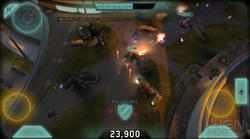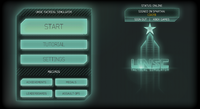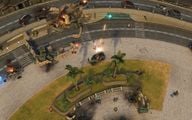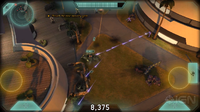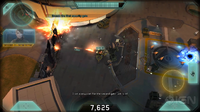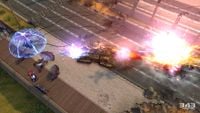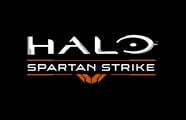Halo: Spartan Strike
From Halopedia, the Halo wiki
| Halo: Spartan Strike | |
|---|---|

| |
|
Developer(s): |
|
|
Publisher(s): |
|
|
Engine: |
|
|
Platform(s): |
|
|
Release date(s): |
|
|
Genre(s): |
Isometric shooter |
|
Mode(s): |
|
|
Rating(s): |
|
Halo: Spartan Strike is an isometric shooter video game and the spiritual successor to Halo: Spartan Assault, developed by Vanguard Games in collaboration with 343 Industries.[1] The game was released on April 16, 2015[3] on Windows 8 and 8.1 devices, Steam for $5.99 (US).[2] Halo: Spartan Strike was also released on the iOS Appstore in 2015. The game is no longer available for purchase on the iOS App Store, but people who bought it in the past years are still able to re-download the game through the "Purchased" tab on the App Store as the game is tied to their Apple accounts.
Synopsis
Characters and setting
As with Spartan Assault, Spartan Strike's campaign employs the UNSC Tactical Simulator as a framing device. Set in two time periods, the story centers on a Forerunner artifact known as the Conduit. The game begins during the Battle of Mombasa in October 2552. The player assumes to role of a Spartan-IV who is placed into the simulation in lieu of the ODST fireteam who actually carried out the mission.[1] After the first operation the narrative jumps to July 2557. A Headhunter is deployed onto Gamma Halo to reacquire the Conduit from the Covenant remnant forces who have taken the artifact to a Forerunner site they refer to as the Altar. After the player is successful, they must deliver the Conduit to an ONI facility in New Phoenix on Earth in the hope of using the artifact to close a slipspace portal that has unleashed a Promethean invasion upon the city.[2]
Plot
Spartan Strike begins in 2557. UNSC Infinity's AI Roland informs an unnamed Spartan-IV that the Office of Naval Intelligence has granted the Spartan access to a highly classified simulation of the Battle of Mombasa. Using a UNSC Tactical Simulator, Roland reveals that the Spartan will simulate the actions of an ODST squad called Alpha-Five sent to secure a Forerunner artifact called the Conduit. In the simulation, Alpha-Five is replaced by a lone Spartan clad in War Master armor.
During the Battle of New Mombasa in 2552, the Covenant brings the Conduit to the city. A Spirit dropship carrying information about the Conduit is shot down by UNSC forces and the Spartan is tasked with recovering the data pad containing the intel. After the Spartan retrieves the data pad, the Conduit's location is pinpointed elsewhere in New Mombasa. The Sangheili carrying the Conduit is killed and the Spartan brings the device to a nearby UNSC convoy. Furious at the loss of the Conduit, the Covenant assaults the convoy in hopes of regaining the device. During the ensuring firefight, a Sangheili Field Master escapes in a Spirit after recovering the Conduit from the convoy. The Spartan pursues the dropship and the Spirit is shot down shortly after. Arriving at the crash-site, the Spartan eliminates the Field Master and his Kig-Yar bodyguards. Once again recovering the Conduit, the Spartan is ordered to escape the city so the Conduit can be brought to a research facility in New Phoenix. However, at the same time, Solemn Penance is preparing to enter slipstream space over Mombasa. Fleeing in a Warthog, the Spartan attempts to flee, but fails to escape the resulting slipspace rupture. Cutting back to 2557, Roland reveals that the ODSTs originally sent to retrieve the Conduit were killed when the slipspace rupture destroyed Mombasa. The Conduit was never found and the UNSC presume that the device was destroyed as well.
Roland reveals that in 2557, a faint signal originating on Gamma Halo was detected by the orbiting Ivanoff Station. In response, a Headhunter was sent to investigate. It was discovered that the source was originating from the Conduit, and Jul 'Mdama's new "Covenant" has also detected the signal and is attempting to take the Conduit for themselves. The Spartan now simulates the actions of the Headhunter during the Battle of Installation 03. To prevent the UNSC from finding the Conduit, signal jammers are placed throughout the jungle in which the Conduit is located. The Spartan destroys the jammers and the device's signal is soon found to be emanating from a nearby Forerunner structure. Utilizing a stolen Wraith to destroy a power core, the Spartan disables a gate blocking the entrance to the structure. The Spartan is attacked by a Promethean Knight inside the structure and it is realized that the source was fabricated by 'Mdama's Covenant to distract the UNSC. Pinpointing the Conduit's true location through the use of UNSC transmitters, the Spartan departs the area in a Pelican. A terminal on Gamma Halo reveals that the Conduit is capable of opening Forerunner slipspace portals throughout the Milky Way. Additionally, it is able to enter slipspace to save itself from destruction—as demonstrated at New Mombasa. Meanwhile, 'Mdama's Covenant discovers the Altar, where they plan to use it to power the Conduit. Once the Conduit is powered, 'Mdama's Covenant intends to open slipspace portals all across Gamma Halo for their Promethean allies, from which they would take control of the Halo from the UNSC.
The Spartan, determined to stop Jul 'Mdama's Covenant, attempts to travel to the Altar in the Pelican. However, the dropship is shot down. Surviving the crash, the Spartan fights past his Covenant soldiers and discovers a deactivated portal that leads to the Altar. Using nearby power stations to activate the portal, the Spartan enters it and appears outside the Altar. Kwon determines that a Scorpion is needed to break past 'Mdama's Covenant's defenses at the Altar. After the Spartan destroys several nearby Anti-Aircraft Wraiths that were preventing the UNSC from dropping off the tank via dropship, a Pelican drops off a Scorpion and the Spartan uses it to fight his way to the Altar. The Spartan kills all Covenant forces at the Altar, and reclaims the Conduit. Realizing they have lost the battle, 'Mdama's Covenant forces begin to retreat from Gamma Halo. Delivering the Conduit to a Pelican, the Spartan operates a Covenant Spirit to leave the ringworld and rendezvous with the Pelican in orbit. After returning to Ivanoff Station with the Conduit, the Spartan receives an emergency distress call from an ONI facility in New Phoenix on Earth. The Spartan learns that when Jul 'Mdama's Covenant used the Conduit at the Altar, portals were opened across the galaxy; one portal opened at the New Phoenix ONI facility, where a Forerunner artifact was being studied. Jul 'Mdama's forces and Prometheans proceeded to invade the city though the portal. Realizing that the Conduit was needed to shut down the portal, the Spartan traveled to Earth with the device to end the invasion.
After being inserted in New Phoenix, the Spartan makes his way through the ONI facility, completing various objectives to hinder Jul 'Mdama's Covenant and Promethean incursion. In the end, the Spartan and an ONI research team use the Conduit to deactivate a Forerunner artifact at the heart of the complex that is generating the portals, halting the invasion. Before the UNSC can reacquire the Conduit from the artifact's core, it makes an automated slipspace jump with an unknown destination.
 This section needs expansion. You can help Halopedia by expanding it.
This section needs expansion. You can help Halopedia by expanding it.
Campaign
The Spartan Strike campaign features five chapters known as "Operations" with six missions each.[1][4]
Features
Halo: Spartan Strike includes a number of refinements to Spartan Assault's gameplay, including improved controls and having the player's virtual thumbsticks as visible circles on the screen. Grenade throwing has been made more precise and new armor abilities are included. The sandbox has also been expanded with the inclusion of the Promethean enemy units and weapons, as well as new vehicles including the Warthog. The game also introduces the Kestrel, inspired by a vehicle cut during the development of Halo 2.[1][2]
The missions and the campaign overall are longer: The overall campaign takes roughly five hours, wheras Spartan Assault's campaign lasts around three to four hours. The difficulty increases progressively throughout the campaign more prominently than in Spartan Assault. Like the original version of its predecessor, Spartan Strike features no multiplayer mode.[2] The game has linked leaderboards and weekly challenges.[1]
The game features in-game credits which can be used to purchase weapons and equipment, the microtransactions featured in Spartan Assault having been omitted. Credits will be earned only through gameplay, although three Achievements in Halo: The Master Chief Collection awards the player a number of extra credits. Playing Spartan Strike also unlocks exclusive multiplayer content for The Master Chief Collection, including an in-game nameplate, emblem and avatar.[2]
Spartan Strike retains many of the specific game mechanics of Halo: Spartan Assault, such as the simple touch of a moving vehicle resulting in an instant splatter kill and weapon racks enabling the player to have technically unlimited ammo on a given area. There is more variety to the weapons than before but some changes are made to vehicle operation. For example, the player can fire the Warthog's turret while driving albeit at a reduced rate of fire. Destroying vehicle debris now requires a certain speed; for example, the Grizzly tank cannot destroy Wraith or Scorpion debris if it is moving too slow. Overheat on the machine gun Turret and Shade Turret is removed. Some weapons are also given more ammo than standard, such as the plasma pistol, where the cap goes to 200 shots and each charged shot only consumes 3 shots, while the rocket launcher is given 15 times more ammo than standard capacity (From 10 to 150) with reduced damage, and the Spartan laser has a shot that lasts for several seconds when firing, with four times the normal battery capacity.
Marines now can no longer be splattered by the player.
Weekly challenges are retained-such as kill with specified weapons or methods-but this time with the XP reward more tidy than the predecessor. There are up to three challenge that can be done in a week, and the harder the challenge, the more XP will be obtained. In March 2018, the Weekly Challenge became unavailable for unknown reasons.
The Windows version of Spartan Strike supports cross-platform integration; a copy of the game is playable on all Windows 8/8.1 devices irrespective of the platform the game was purchased on along with shared stats. As with Spartan Assault, the Steam version is excluded from this integration as the Steam platform does not share the Xbox Live gaming profile.[2]
Appearances
Marketing and release
Halo: Spartan Strike was announced by an article and gameplay video at the video gaming website IGN on October 15, 2014.[2] The following day, an announcement trailer was released on Halo Waypoint's YouTube channel alongside the creation of an official page for the game at the Halo Waypoint website.[1][5] The game was initially scheduled for a December 12, 2014 release, however on December 5, 343 Industries announced that the game would be pushed back to early 2015 due to continuing issues with Halo: The Master Chief Collection's online multiplayer.[6] After months of no news on the game's release date, Spartan Strike was released on April 16, 2015.[3]
Gallery
Gameplay
A Covenant lance utilizing a bubble shield.
Cinematics
Logos and banners
Sources
- ^ a b c d e f g h i j Halo Waypoint: Halo: Spartan Strike
- ^ a b c d e f g h IGN, Halo: Spartan Strike Announced for Windows Devices and Steam – IGN First
- ^ a b c Halo Waypoint: Halo: Spartan Strike released!
- ^ Halo: Spartan Strike operation screens
- ^ YouTube: Halo: Spartan Strike Announce Trailer
- ^ Halo Waypoint - Halo: Spartan Strike Coming in Early 2015
| ||||||||||||||||||||||||||||||||||||||||||||


